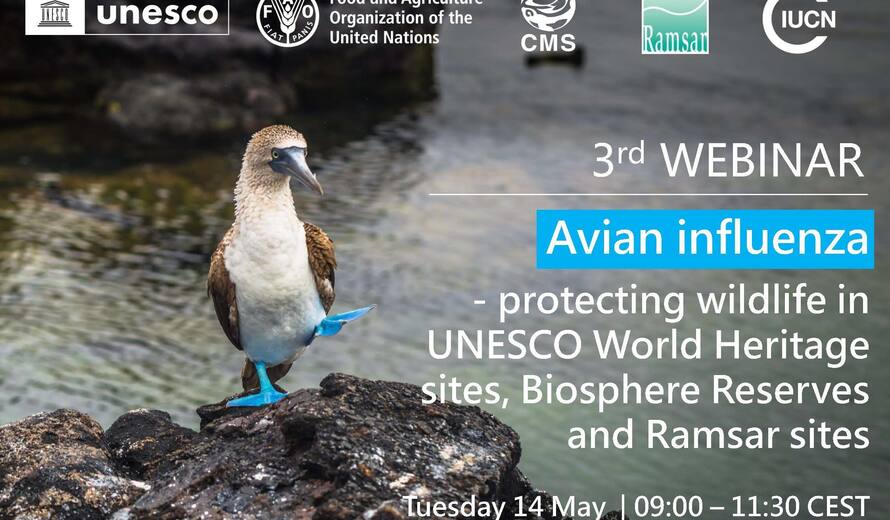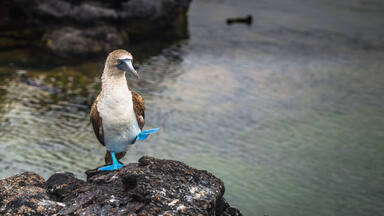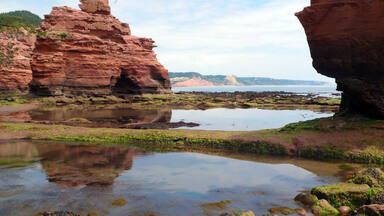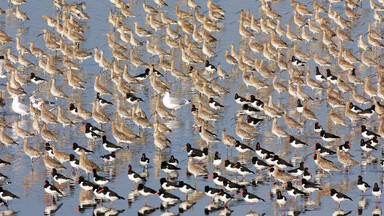Webinar: How to protect wildlife from avian flu in UNESCO World Heritage sites, Biosphere Reserves and Ramsar sites
Highly pathogenic avian influenza, known as bird flu, is causing significant mortality of wild birds and mammals worldwide, requiring authorities to take action to curb its spread. Previously affecting mostly domestic poultry, the virus has become a major risk for wildlife, including in UNESCO World Heritage sites, Biosphere Reserves and Ramsar sites recognised internationally for their importance to nature conservation.
UNESCO World Heritage Centre, UNESCO Man and the Biosphere Programme, the Secretariat of the Convention on Migratory Species (CMS) and its CMS FAO Co-convened Scientific Task Force on Avian Influenza and Wild Birds, and the Secretariat of the Ramsar Convention on Wetlands of International Importance, together with the International Union for Conservation of Nature are jointly organising a series of regional webinars on avian influenza and protected areas.
The webinars will:
- increase visibility for the impacts of avian Influenza on wildlife in conservation areas of global importance;
- present scientific resources, policy recommendations and practical guidance from various sources including the CMS FAO Co-convened Scientific Task Force on Avian Influenza and Wild Birds;
- share experiences from affected World Heritage sites, Biosphere Reserves and Ramsar sites.
The first webinar was held on Friday, 19 April 2024 at 15:00 - 17:30 CET / 09:00 - 11:30 GMT-5, targeting authorities and managers of internationally designated sites in North America, Latin America and the Caribbean. During the webinar, English and Spanish translation will be available.
The second webinar on the avian influenza entitled “How to protect wildlife from avian flu in UNESCO World Heritage sites, Biosphere Reserves and Ramsar sites” was held online on Friday 26 April 2024 from 11:00 AM to 13:30 PM CEST / 9:00 AM to 11:30 GMT via Zoom, targeting authorities and managers of internationally designated sites in Africa and Europe. The Ramsar Secretariat will host the event.
During the webinar, English and French translation will be available.
The third webinar on the avian influenza entitled “How to protect wildlife from avian flu in UNESCO World Heritage sites, Biosphere Reserves and Ramsar sites” will be held online on Tuesday 14 May 2024 from 9:00 AM to 12:00 CEST / 17:00 PM to 20:00 AEST via Zoom, targeting authorities and managers of internationally designated sites in Asia and the Pacific Region, will be hosted by UNESCO. Webinar will be in English.
To register for the third webinar on 14 May 2024, please click here:
If you have any questions, please contact the Natural Heritage Unit of the UNESCO World Heritage Centre E-mail: wh-nature@unesco.org
The webinars are organized with the financial support of the Swiss Federal Office for Environment (FOEN).
Speakers
Dr. Marcela Uhart - Director for the Latin America Program Karen C. Drayer Wildlife Health Center, School of Veterinary Medicine, University of California, Davis
Marcela Uhart is a wildlife veterinarian from Argentina, with 30 years of experience in marine mammal and seabird conservation and health research in Latin America. She has been investigating the impacts of avian influenza on wildlife since 2006 and currently serves on the steering committee for OFFLU, the World Organization for Animal Health (WOAH) and FAO Network of Expertise on Animal Influenza, is an appointed member of the WOAH Working Group on Wildlife and serves on the Intersessional Group on High Pathogenicity Avian Influenza H5N1 for the Agreement on the Conservation of Albatrosses and Petrels (ACAP).
Dr. Ruth Cromie, Co-ordinator of the CMS FAO Co-Convened Scientific Task Force on Avian Influenza and Wild Birds
Dr. Ruth Cromie is a wildlife health biologist whose work has focused on preventative approaches to managing health in natural settings, writing substantive guidance for Parties to the Ramsar Convention on Wetlands and CMS (as CMS Councilor for Wildlife Health). As Co-ordinator of the CMS FAO Scientific Task Force on Avian Influenza and Wild Birds and from her previous work as Head of Ecosystem Health at the Wildfowl & Wetlands Trust, she has extensive experience of dealing with preparedness and response to HPAI in wildlife. This ranges from the practical aspects of surveillance and organizational contingency planning to capacity building, advocacy and policy, most recently in development of an updated HPAI resolution for Parties to CMS.
Dr. Kristine Meise, Programme Officer, Flyway and Biodiversity at Common Wadden Sea Secretariat
Kristine Meise has a PhD in behavioural ecology and is working as the Project Officer for Flyway and Biodiversity at the Common Wadden Sea Secretariat, the joint secretariat of the Trilateral Wadden Sea Cooperation involving Denmark, Germany and the Netherlands. In her role, she is responsible for coordinating the trilateral exchange on migratory and breeding bird issues in the Wadden Sea, while also acting as a coordinator for the Wadden Sea Flyway Initiative.
Mr. Danny O. Rueda Cordova – Focal Point of the Galápagos Biosphere Reserve
Mr. Danny O. Rueda Cordova is the Focal Point of the Galápagos Biosphere Reserve with having 20 years of experience in protected area management. He participated in the design and execution of several projects for the conservation of native and endemic species; control and/or eradication of introduced species; ecological monitoring of island and marine ecosystems; control and surveillance; and sustainable use of environmental services. He worked as the Director General of the Galapagos National Park for 4 years. He was part of the technical team for the development of the Galapagos National Park Management Plan (2005), the Galapagos Protected Areas Management Plan for Good Living (2014) and technical coordinator of the new Zoning System of the Galapagos Protected Areas (2016).
Dr. Michelle Wille - Senior Research Fellow, Centre for Pathogen Genomics, Department of Microbiology and Immunology, Australia
Dr. Michelle Wille is a senior research fellow at the Centre for Pathogen Genomics, at the University of Melbourne. She is interested in the ecology and evolution of avian viruses, with a key focus on avian influenza viruses. She has worked extensively on low pathogenic avian influenza in North America, Europe and Australia. She has extensively contributed to preparation activities for HPAI in Australia and Antarctica. Beyond avian influenza, Dr. Wille has worked revealing virome-scale ecology in birds, describing numerous novel avian viruses and revealing factors modulating these virus communities in Australia.
Dr. Tiggy Grillo - Co-Chair, IUCN SSC Wildlife Health Specialist Group
Dr. Tiggy Grillo is a veterinarian, who has been working at Wildlife Health Australia since 2009. She is Australia's World Organisation for Animal Health (WOAH) Focal Point for Wildlife Health and Co-Chair of the IUCN SSC Wildlife Health Specialist Group (IUCN WHSG).
Dr. Kosuke Okuya, Assistant Professor, Joint Faculty of Veterinary Medicine, Kagoshima University, Japan
Dr. Kosuke Okuya is a virus researcher with a keen interest in the ecology of wildlife-borne viruses, including avian influenza viruses and those derived from bats. He has conducted research on avian influenza surveillance, focusing on the Izumi Wintering Habitat of Cranes in Kagoshima Prefecture, Japan. His work has played a pivotal role in developing robust surveillance frameworks aimed at monitoring outbreaks of highly pathogenic avian influenza.
Dr. Grant Matthews, Manager Animal Disease Team, Office of the Chief Veterinary Officer, Biosecurity, Ministry for Primary Industries, New Zealand
Dr. Grant Matthews is a veterinarian based in the Office of the Chief Veterinary Officer at Biosecurity New Zealand, a branch of New Zealand’s Ministry for Primary Industries (MPI). Dr. Grant’s work includes helping to ensure the country is prepared for exotic disease incursions, such as highly pathogenic avian influenza. After a number of years in large animal clinical practice, and time in the commercial world, Dr. Grant joined MPI over 5 years ago as part of the Mycoplasma bovis eradication programme, before moving to the office of the Chief Veterinary Officer 2 years ago.
Dr. Simone Vitali, Program Manager – Emergencies, Wildlife Health Australia
Dr. Simone Vitali is the Program Manager for Emergencies with Wildlife Health Australia (WHA), the coordinating body for wildlife health in Australia, which acts to protect and enhance the natural environment through a strong One Health focus. Simone is a veterinarian who worked in the zoo industry for over 20 years and has been involved in wildlife veterinary conservation projects for a range of species. Simone has been involved in developing state and national strategies and procedures for a broad spectrum of wildlife health issues, including emergency diseases, oiled wildlife, bushfires, marine mammal strandings, and disease risk analysis.





